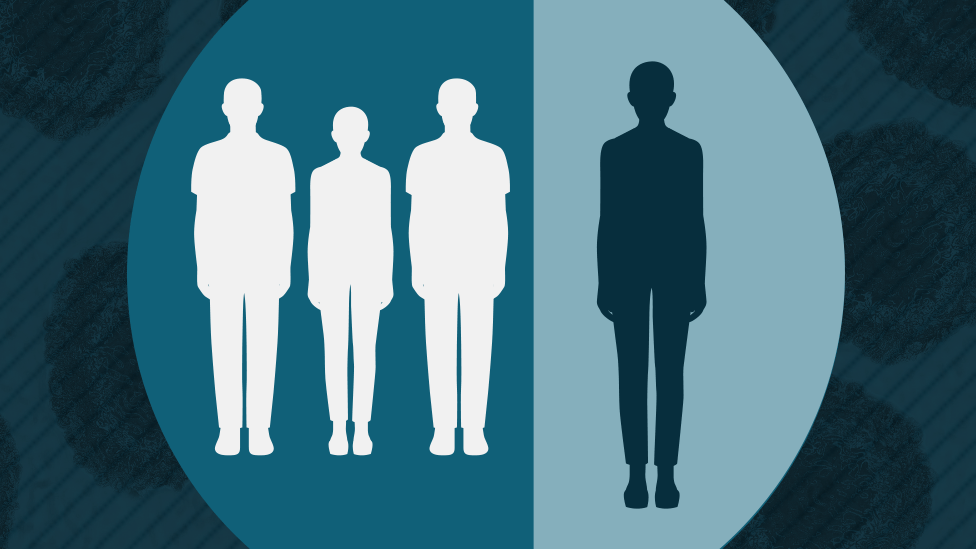Coronavirus lockdown: Why can't some businesses reopen in England yet?
- Published
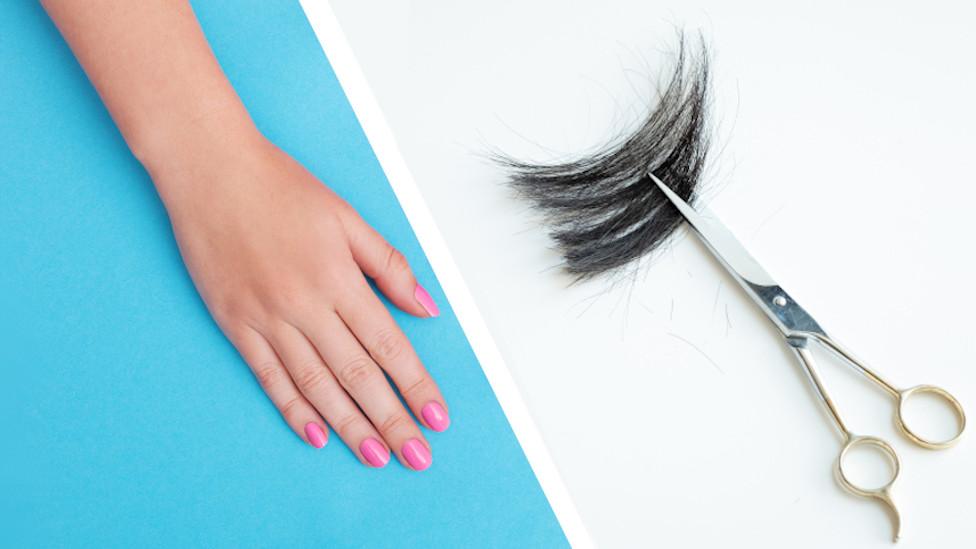
Pubs but not clubs, hairdressers but not nail salons. The planned changes to England's coronavirus lockdown on 4 July have left many businesses questioning why they can't reopen yet but others can.
The government hasn't spelt out exactly how it made its decisions, but what might be some of the reasons to keep some businesses shut and others open?
Pubs v nightclubs
Pubs, bars and restaurants are set to reopen, but nightclubs will remain shuttered.
"The whole way a nightclub works is getting people in close proximity," says virologist Dr Chris Smith. Compare that with pubs, where "the whole ethos isn't about dancing with people and mating and dating". A nightclub with the 1m social distancing rule would have "zero atmosphere".
The difference could also be linked to noise. Loud music in clubs forces people to talk louder or shout. When people talk more loudly or sing, they produce higher numbers of respiratory droplets, experts from the government's Scientific Advisory Group for Emergencies say, external. These droplets are projected into the air, to be inhaled by other people - meaning the risk of spreading the virus is higher.
Add to this the possibility that if people are dancing in a club and breathing quicker, they could potentially inhale more of those droplets. The singing point is born out perhaps in Sage's observation that at least two outbreaks are associated with choir rehearsals.

In Japan, some customers have donned plastic facemasks in bars
The government's own advice, external urges all businesses to avoid playing music that might force people to talk louder or shout to communicate. Live music or comedy isn't allowed anywhere.
Hairdressers v tattoo parlours/nail salons/spas
All these trades are considered "close contact services", external and very few are allowed to reopen. Hairdressers and barbers are an exception.
The "highest risk zone" is the area in the front of someone's face, says the government, and so businesses that need staff to be within that area for most of the appointment (make-up, spa or beauty services, for example) should not reopen. Tattoo parlours say it's frustrating having to stay shut - especially since they have long been required to have measures in place to prevent cross-contamination.
But "touching people is definitely a risk factor," says Dr Shaun Fitzgerald, visiting professor in civil engineering at the University of Cambridge. "Wherever people are touching, that's a known transmission risk factor."
Dr Fitzgerald - who also sits on the Sage Environmental Modelling Group - says the position people gather in is also a factor that can increase your risk.
"Even at 2m distance, it's better not to be face-to-face, but face-to-back, or back-to-back, or side-to-side."
There are large and small particles that come from people's airways, he explains. Smaller particles linger in the air - with a higher concentration around someone's face - but larger ones are "like ballistics" and are projected out in front.
This could be one reason why hairdressers - who can for the most part stand behind or to the side of a client - are allowed to open first.
Virologist Dr Smith adds: "When you go in to get your nails done, your hands are on the table, you're leaning forward… you're having to go very close to that person, face to face."
He also weighs up the value of hairdressers compared with the others. "Your life does not depend on getting a tattoo [or your nails done]. But if you don't get your hair cut... you might even lose your job."
Outdoor gyms v indoor gyms
People can go to outdoor gyms to exercise, but indoor gyms and dance studios will stay shut for now - although ministers have suggested, external they could reopen by the end of July. The rationale is ventilation: the more fresh air there is, the lower the concentration of virus particles.
"If you provide fresh air into the space, the dirty air is leaving the space," says Dr Fitzgerald. The virus is swept out to the outdoors where it will be in a "ridiculously low concentration".
But what about the gym and exercise itself?
A study in Norway, external looked at whether people who went to the gym were at a higher risk of coronavirus than those who didn't. Although small, the study found no increased risk for gym-goers and the country has since reopened all indoor gyms, albeit with social distancing in place.
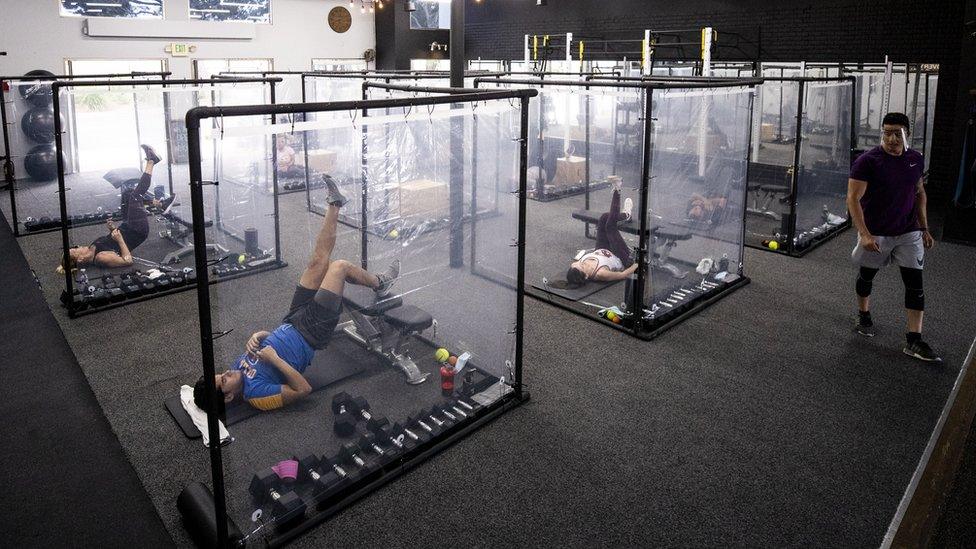
In Los Angeles, a fitness instructor trains students surrounded by plastic sheets
Dr Fitzgerald says he has not seen any data to suggest dancing or running on a treadmill increases transmission.
But of the data he has seen, there's a link between virus particles and breathing rate. If you're breathing quicker, the risk of spreading or catching the virus may be higher.
And can sweat spread the virus? "We don't think so," says Dr Smith.
Amusement arcades v casinos
The decision to keep casinos closed but reopen arcades and bingo halls has been called "inconsistent" by the Betting and Gaming Council,, external which represents casinos. Could ventilation be a factor, with many seaside amusement arcades having open fronts, or the fact that at casinos people handle cards and chips? Or could it be something to do with the average time spent in such places?
"You're in much closer proximity to people, face-to-face, lots of games, it's very, very difficult to socially distance and play cards," says Dr Smith.
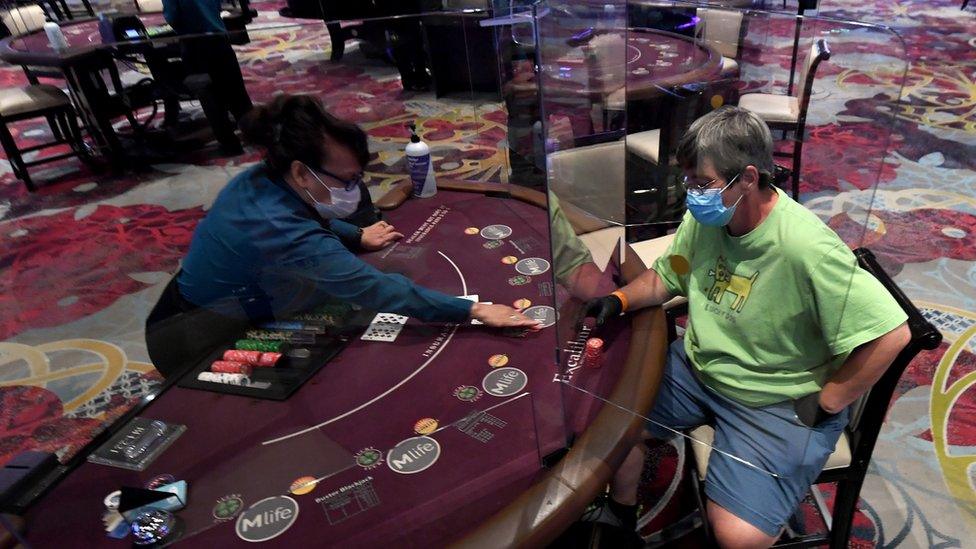
Blackjack in a Las Vegas casino earlier this month - but with masks, gloves and screens
Dr Fitzgerald says the length of time spent in a place with an infected person increases risk. It is unlikely someone would inhale one little virus particle and become infected, he says. Instead, there's usually a threshold of virus particles you need to reach before you become ill.
"You know the risk will increase the more particles you inhale. If you can reduce the time you may be in the vicinity, that will reduce your risk."
Cinemas v theatres
Cinemas, theatres and concert halls are allowed to open - but, crucially for the latter two, without any live performances. The government says the ban, external on live theatre, comedy or music is "to mitigate the risks of aerosol transmission - from either the performer(s) or their audience". One suggestion, external has been to put up a clear screen between the cast and audience.
How cinemas will reopen after lockdown
"When you are at the theatre, the performers are dancing around, singing around and they are going to produce more aerosols," said Dr Smith.
In its review of how safe businesses would be with a 1m rule in place,, external the government differentiated between theatres and cinemas, saying "further work may be required to mitigate risk" in theatres. But the reasons for opening some businesses and not others may not be completely down to the virus.
"Reopening each extra business increases the transmission risk for coronavirus," says Dr Gemma Tetlow, chief economist at the Institute for Government think tank. "There is a trade-off between health risks and the economic benefits you get from being open again.
"The government might have made the decision that, actually, people's mental well-being and the UK economy is really helped by pubs and cinemas opening but actually theatres don't deliver such benefits. Or perhaps they deliver benefits to different groups of people.
"The government might be particularly worried about the mental health of people in crowded, built up, urban areas… and you might therefore open some types of social venues in preference to others."
- Published24 June 2020
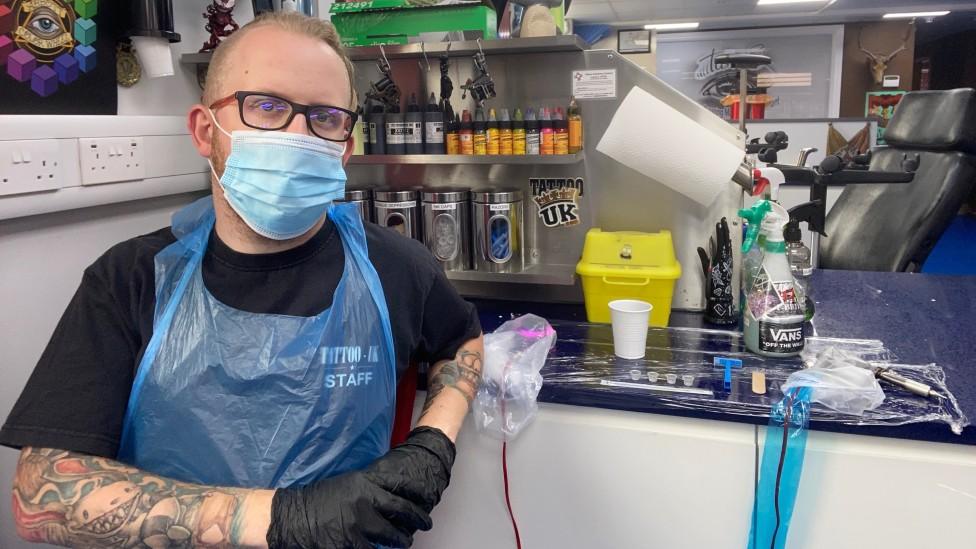
- Published1 July 2022

- Published25 January 2022
